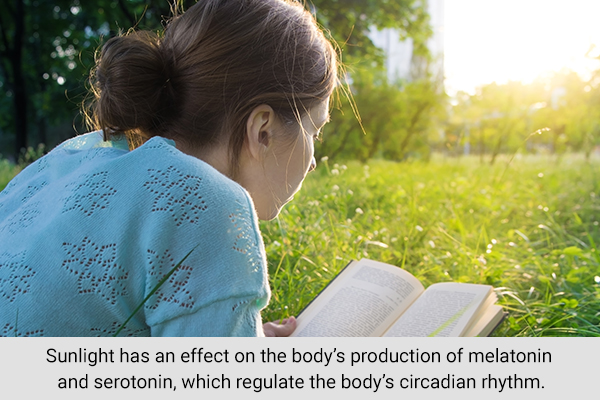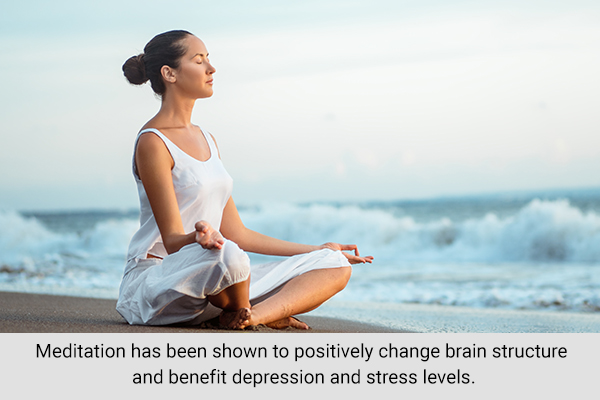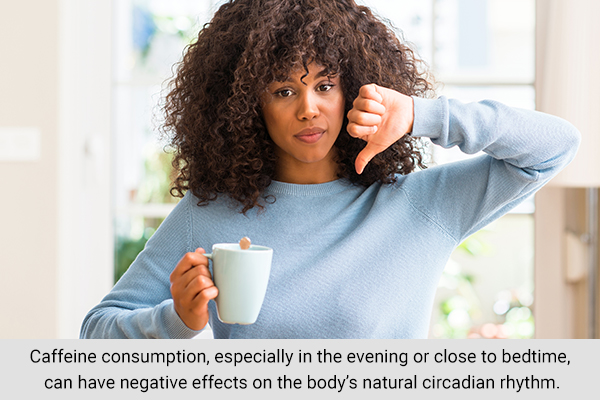In this article:
The winter season means fewer hours of daylight as well as seemingly endless chilly nights that keep us cooped up under the blankets for the major part of the day. Such a seasonal slump can put a damper on the spirits and take its toll on the most optimistic amongst us.

This is a normal and repetitive phenomenon. In medical terms, it is known as seasonal affective disorder (SAD), which is more than just winter blues. It’s a major type of depression that recurs every year and usually starts in fall, continues in winter, and lifts in spring.
It’s often linked with tiredness, sleeping too much, carbohydrate cravings, and weight gain. In its severe form, you can have feelings of hopelessness and suicidal thoughts.
Conversely, a very rare form of seasonal affective disorder known as summer depression manifests itself during spring and early summer and culminates with the arrival of autumn and winter months.
Causes of Seasonal Affective Disorder
Although the exact causes for these seasonal mood swings remain unidentified, there are certain biological indicators associated with seasonal affective disorder:
- Minimal sun exposure during the fall triggers an imbalance in the level of serotonin in the body, which is a key mood-regulating neurotransmitter.
- Similarly, the reduction of daylight hours tends to throw off your body clock and disrupt your sleep pattern. This is on account of the overproduction of a sleep-related hormone called melatonin, which is spurred on by the long spans of darkness in a day.
- Lastly, seasonal affective disorder symptoms may also stem from vitamin-D insufficiency, which is common during the winter months due to reduced sunlight.
- Seasonal affective disorder most often occurs in women, adolescents, and young adults, especially those with a family history of depression.
- People living in the northern latitudes are particularly affected by seasonal affective disorder as these areas experience significant alterations in the weather and daylight hours with different seasons. (1)
Signs and Symptoms of Seasonal Affective Disorder

The key symptoms of seasonal affective disorder are:
- Depression
- Sleep problems
- Lethargy
- Erratic eating patterns, marked by overeating and episodes of loss of appetite
- Craving for carbohydrate-rich foods and consequent weight gain
- Excessive sleeping and drowsiness
- Irritability
- Feeling down and unsociable
- Loss of interest in activities you otherwise took pleasure in
- Difficulty concentrating
- Persistent feelings of guilt, hopelessness, and worthlessness
- Having frequent thoughts of death or suicide
Natural Treatment Options for Seasonal Effective Disorder
Whether it’s a more serious depression or just the blues, if your mood dives down in winter, here are some tips to swing it back up.
1. Get more exercise!
Exercise can release your brain’s feel-good chemicals, and you don’t have to run a marathon to get positive effects. Start small by parking a block further from work. Or start bigger by taking a dance class or digging out your gardening gloves. If you make it fun, you’re more likely to stick to it.
Early risers can benefit from a morning jog or walk, which will set their day off to an energetic start. Meanwhile, going for a run when the sun is at its peak will offer the double perks of exercise and light therapy.
Regular exercise is as effective as an antidepressant for some people. It has been shown to decrease depression severity in women with seasonal affective disorder. (1)
Walking, light aerobic exercises, and yoga are all examples of exercises that can boost your mood.
2. Soak in the sunlight

The amount of sunlight you get in a given week can affect your mood if you suffer from seasonal affective disorder. (2)
The sustained shortage of sun exposure is one of the leading causes of seasonal affective disorder, as it leads to depression-inducing hormonal imbalances in the body.
Sunlight has an effect on the body’s production of melatonin and serotonin, which regulate the body’s circadian rhythm. Light affects the levels of melatonin, which is chiefly responsible for the regulation of the circadian rhythm. In a sense, light acts like antidepressant medications as it directly affects the same neurotransmitters as those influenced by antidepressants.
In addition to melatonin, light plays a direct role in the regulation of serotonin, norepinephrine, and dopamine, all of which have considerable bearing on your mood.
You’re hitting two birds with one stone when you exercise outdoors to boost your mood: exercise and natural light. (3)
During the winter, try to soak up as many rays as you can in a day. Open the blinds, pull the curtains back, or walk outside in direct sunlight. Even inside your home, try to choose pale colors that reflect light from outside.
Spending a few hours by the window, sipping a hot beverage, and reading a book sounds like a promising antidote to kiss away your winter blues.
If you live in a place with few windows or poor sun exposure, you might be prescribed light box therapy for 30–45 minutes in the morning. This form of light therapy can be a therapeutic intervention for the prevention and treatment of depression, but only when done under medical supervision.
There are potential risks from inadequate treatment and from using a light box if you have diabetes, eye problems, or a type of mood disorder called bipolar depression where your mood can become too irritable or elevated.
There are a lot of light boxes for sale on the Internet, but check with your doctor to make sure you’re getting one that’s safe and effective.
3. Check your vitamin D level

Low vitamin D levels are associated with depression. (4) Sunlight is one of the prerequisites for the body to manufacture vitamin D, and a lack of it can lead to insufficient levels in the body.
If you reside in an area that runs low on sunlight or lead a life that leaves you devoid of sufficient time in the sun, taking a vitamin D supplement may be a viable alternative to avert the risk of seasonal depression.
However, check your levels before you supplement. Extremely high levels can be toxic. It is, thus, well advised to consult your doctor for the preferred dosage.
Good natural sources of vitamin D include milk fortified with vitamin D, egg yolks, cheese, and fatty fish such as wild-caught salmon, tuna, and mackerel.
4. Stock up on omega-3 fatty acids
If you’re deficient in omega-3 fatty acids, you’re more likely to suffer from mood problems. (5)
The two main types of omega-3 fatty acids are eicosapentaenoic acid (EPA) and docosahexaenoic acid (DHA). Both EPA and DHA play important roles in nerve function and mood regulation. In fact, people with higher levels of omega-3 fatty acids are likely to experience only moderate or mild symptoms of depression.
Several recent studies have identified a deficiency of omega-3 fatty acids as a contributing factor to mood disorders, including seasonal affective disorder. This evidence suggests that omega-3 fatty acid supplementation is a potential treatment approach for these mood disorders. (5)(6)
To get more omega-3, you can:
- Include cold-water fish such as salmon, tuna, sardines, and anchovies in your diet.
- Eat more flaxseeds, walnuts, and omega-3-fortified eggs.
- Take an omega-3 fatty acid supplement.
Note: Omega-3 fatty acids can interact with certain drugs, so check with your doctor or pharmacist, especially if you’re taking a blood thinner (including herbal supplements that can thin the blood). The FDA recommends a total omega-3 fatty acid supplement dosage of 2 grams/day.
5. Do at least 10 minutes of meditation daily

Meditation effectively relaxes both the body and the mind, which in turn leads to increased activity in the parts of the brain associated with happiness and reduced activity in the parts of the brain associated with stress.
It may feel strange to sit and do “nothing,” but by focusing on your breathing or repeating a single word for just a few minutes a day, you’re nourishing your nervous system.
Meditation has been shown to positively change brain structure and benefit depression and stress levels. (7)(8)
Regular practice is more important than marathon sessions. Just 10–15 minutes a day can help you over time. Start doing meditation for a few minutes initially; then gradually increase the time to at least 10 minutes a day.
You can listen to a guided meditation. You can focus on your breath as it flows in and out of your body. Alternatively, you can repeat a mantra or take a Tai chi class.
Try different techniques to see which you like best.
6. Snack on dark chocolate
If you eat dark chocolate, you might be helping your stress levels and mood. (9) Thus, eating chocolate is one of the tastiest ways for lifting your spirits, making it a popular favorite among those who are prone to such seasonal slumps in the mood.
Eat chocolate that’s at least 70% cocoa.
7. Avoid coffee and switch to green tea

If you love coffee, you don’t have to give it up. The caffeine in your coffee helps mood, alertness, and thinking. However, increasing your consumption to more than a cup or two a day can affect your sleep and make you more anxious.
Caffeine consumption, especially in the evening or close to bedtime, can have negative effects on the body’s natural circadian rhythm. By delaying the body clock, caffeine consumption often results in sleep problems. The lack of sleep, in turn, brings in its wake poor mood and depressive symptoms.
Therefore, it’s well advised to let go of those extra cups of coffee and drink green tea instead. It has less caffeine and contains L-theanine, an amino acid that has a palliative effect on anxiety. (10)
8. Spend time with other people and animals
If you find yourself isolated, reach out to connect with people and animals.
Studies show that socializing with humans or contact with pets can boost the mood. (11)(12) Keep in touch with people you care about. Go to social events. Volunteer with animal rescue agencies.
Accept invitations to social events, even if you only go for a little while. Always remember that socializing instills a feeling of self-worth and belonging. A pleasant tête-à-tête with a well-meaning friend might just end up bringing a smile to your face.
9. Sing away the blues

Give your vocal cords a flex and join a choir group to away your moody troubles.
Research indicates singing and group singing, in particular, has positive effects on mood and general well-being. Who knew something as simple as singing can enhance the quality of your overall life! (13)(14)
10. Get a massage
Who doesn’t love a good massage? Well, here’s another great reason to frequent your spa or therapist.
Studies show that even as little as 15 minutes of massage once or twice a week can help lift the mood. (15) If you are not in the mood to venture out, just get your loved one to give you a cathartic back, neck, or shoulder rub, and that should do it.
Prevention of Seasonal Affective Disorder
- Try color therapy, which can help boost your mood and stimulate certain feelings during the dark and gray winter months.
- Bring a bit of cheer into your home with brilliant, vibrant colors and light.
- Aromatherapy can also provide solace and evoke pleasant memories.
- Keep an optimistic attitude toward life and think positive to melt away the winter blues.
- Listen to upbeat or cheery music to significantly improve your mood.
- Taking a vacation to a warmer climate with lots of sunshine has enormous benefits for your physical and mental well-being.
- No matter how much you want to sleep until noon, stick to your regular sleep schedule.
- Keeping your mind active with a new interest or hobby can also help ward off symptoms of seasonal affective disorder.
- If you are not able to overcome seasonal affective disorder or your symptoms are more serious, you can undergo talking therapy such as counseling or cognitive behavioral therapy (CBT). Joining a support group and sharing your experience with others can also have a therapeutic effect on your condition.
When to See a Doctor

If your winter blues don’t lift and drive you to the point of hopelessness or if you notice more symptoms that suggest seasonal affective disorder, see a licensed health care professional or doctor to see if light therapy, psychotherapy, or medications are needed.
If the depressive spell continues for days on end, your health will start deteriorating on account of unhealthy appetite and sleep patterns.
Final Word
If you struggle with overwhelming thoughts about death and self-harm or find yourself taking refuge in alcohol or drugs to tune out depression, sign up for mental health counseling by a trained professional.
Let your family and friends support you through these tough times, instead of braving it alone.
- Was this article helpful?
- YES, THANKS!NOT REALLY



